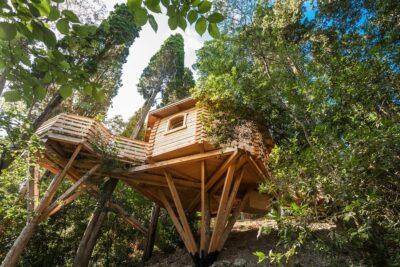Living off the grid is so much more than changing how you source your power. It is usually the door to a radical change in lifestyle – one that offers benefits in health and well-being. Here are five interconnected ways that living off-grid inspires you to work less and live more.
Financial freedom– Many people who want to live off-grid begin with a desire to save money on their energy bills and to not be dependent on a public power supply. Taking the next step requires finding a dwelling place that allows you the ability to power it through other means. This step usually involves leaving an urban area for a rural setting. While there can be some pretty substantialexpenses in setting up your off-grid power system, it eventually pays for itself many times over.
Additionally, people who live off-grid tend to buy or to build modest homes and enjoy having the burden of rent and mortgage payments lifted from their shoulders. Other savings come from not having water bills or waste collection fees.
Living in a smaller space encourages other habits that lead to a debt-free lifestyle. To put it simply, with less space, you desire less stuff. You tend to appreciate quality over quantity. You grow to be content with a pared-down wardrobe, less furniture and fewer toys and gadgets.
According to the National Institute of Mental Health,living with debt negatively affects our mental health. A recent research study published in the Clinical Psychology Review revealed that mental health problems — including depression, anxiety, andpsychotic disorders — are three times more likely to occur among people who have debt.
Healthier living– In addition to the mental health benefits of living better within your financial means come the physical rewards of an off-grid lifestyle. Living away from an urban setting encourages you to do more things for yourself, andthat often involves more physical tasks.
Whether it is chopping wood for the woodstove, hauling feed for the chickens or heading to the stream for water, living off-grid involves hard work. This physical labor is a healthyexercise that translates into a stronger body. (And no expensive gym memberships are required to stay in shape!)
Another common outgrowth of living off-grid is growing and raising your food. Not only does gardening add to your financial freedom through lower grocery bills, but it also helps you eat more nutritious and wholesome foods. You control what you feed your chickens, and you control what you put in your garden.
Learning all the time– Many urban dwellers get stuck in a mental rut. Each workday has a sameness to it that allows little room for creativity and education. Not so, for the off-grid dweller. Tolive successfully off-the-grid, you must learn and sharpen skills all the time.
This new knowledge runs the gamut from carpentry and plumbing know-how to gardening expertise to survival tactics. You read and study through books and workshops in some key areas, and you learn more by establishing friendships with people who have more experience living off-grid than you do.
Becoming a lifelong learner has many health benefits. The Harvard Business Review notes that learning new activities helps preserve cognitive function and memory as we age and can even help delay the symptoms of Alzheimer’s Disease.
Smaller ecological footprint— An off-grid lifestyle translates into a less wasteful way of life. You become more aware of what is essential and what isnot. You find that you canget by with less and less. You enjoy the look and feel of natural products and fibers more and seeit tobe both convenient and necessary to reuse and multi-purpose items in your home and on your property.
This new awareness benefits both you and the world around us all.
More time– There are many sayings about what people regret when they are on their deathbeds, but most of them come down to the common theme of lamentingwasted time on unimportant things. Perhaps the best advantage of living off-grid is that you can reclaim some of the time you have lost.
Although it takes work and effort to manage an off-grid home and property, the lifestyle lends itself to you using your time better and more efficiently. Since you don’t care about possessions as much, you need less time looking for them and less money buying them.
You get a natural rhythm to your days that is in better harmony with the daylight and with the seasons. Hard work and fresh air help you sleep better and feel more energized in the morning.
When you are off-grid, you want your power sources to go for the essentials, so that means less time spent on tech-oriented distractions, such as video games and social media. You find that you prefer to spend your time in conversation with your family or in low-tech or no-tech activities such as playing board games, making crafts, repairing and building things or reading together.
Living an off-grid life is not for everybody, but for those who are willing to take the plunge, it can be a joyous and rewarding experience. “We can’t go back,” says Jeff,who lives debt-free and off-grid with his family of seven in rural northern British Columbia. “Gridlessnessis too good.”
Sources
https://hbr.org/2017/02/lifelong-learning-is-good-for-your-health-your-wallet-and-your-social-life
https://www.offthegridnews.com/how-to-2/5-kids-40-acres-and-a-25000-house/
 Off The Grid News Better Ideas For Off The Grid Living
Off The Grid News Better Ideas For Off The Grid Living




